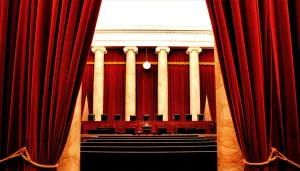Two nights ago, the Supreme Court of the United States committed an unconscionable act. It declined to strike down a Texas law which effectively deputizes ordinary Texans to determine whether or not a person has had an abortion within six weeks of conception and endows them with the right to sue any violators of the law. Worse, the Court issued its ruling through what is known as the “shadow docket,” an abbreviated process for considering cases that eschews thorough procedure. The decision signals the effective overturning of the landmark Roe v. Wade decision, in defiance of decades of precedent.
Legalizing a practice that approaches vigilantism is horrifying in and of itself, regardless of one’s stance on abortion, but the Court’s shameless procedural maneuvering ought to be too. As I wrote in last Sunday’s Focus, the Supreme Court has been too powerful for centuries, an un-checked, even extra-constitutional presence in the American political landscape. This problem is bigger and goes deeper than this particular moment, and, as I said in my recent Focus, has been a thorn in the sides of progressives and conservatives alike at different times.
One response to the Court’s undue power has been a call for expansion. The argument is that President Joe Biden cannot reasonably expect any major policy initiatives to pass muster under the eye of the Court’s resident conservative ideologues, and thus that he should nominate four liberal justices to be confirmed by the Senate. It’s worth noting that the Court is not constitutionally fixed to nine justices and that its number has shifted over time, but a political expansion of this kind has not occurred since Reconstruction.
Regardless, expansion has its risks. Once done, there is no serious argument that when—not if—Republicans hold the Senate and White House concurrently, they will not simply add their own justices. A spiral of tit-for-tat would ultimately mean that the Court is no longer an independent branch of government. Rather, proponents of expansion seem to embrace the Court’s role as policymaker.
For this reason, expansion contains a germ of serious danger. The Court, thus effectively a third legislature, would still maintain its power of judicial review; it would be unconstrained by the Constitution, unlike the Senate and the House of Representatives; and it would still be removed from popular control. Rather than curb the Court’s excessive power, expansion could realistically turn that power into something even more monstrous.
Rather than expand the Court, a better approach to deal with both this particular issue and the deep-seated problem of the court’s unchecked power would be for the Senate to abolish the filibuster and codify Roe, and any other policy initiatives previously under the Court’s prerogative, in law. Congress’ tacit acceptance of the Court as a policymaking body has been part and parcel of its abdication of its own legislative responsibility. Congress should also be more aggressive in re-drafting legislation struck down by the Court and introducing reforms that constrain the Court’s effectively super-constitutional authority.
“Nuking” the filibuster has been painted as an extreme move, but the modern practice is not half-as-old as the current size of the Supreme Court. What’s more, eliminating the filibuster would result in a majority-led Congress and a checked Court. Utilizing the Court as an arm of party politics would obliterate its independence and leave Congress incapacitated, offering a new legislative branch in its place without accountability or guard-rails.
Expansion may be an attractive short-term fix, and it’s not entirely fair to rule out a scenario in which it makes sense to change the number of justices that sit on the nation’s highest bench, but the addition of four liberal justices is dangerous and short-sighted. Furthermore, despite arguments that expansion is the most politically feasible way to deal with the Court’s excessive power, it’s not clear that it’s much—if at all—more feasible than the alternative articulated above. The individuals that stand in the way of the elimination of the filibuster are the same ones that stand in the way of four new liberal justices.
It may well be that we live in a political moment which requires reshaping or even doing away with past norms if democracy, accountability, and liberal rights are to be preserved, but that does not absolve any of us from being critical about which norms we ought to jettison and how we reshape them to build a more democratic and decent society.


Comments
Join the conversation